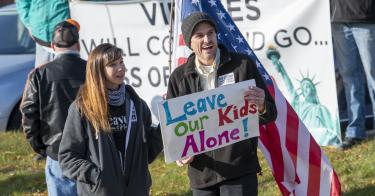Americans who think that COVID-19 is behind us aren’t reading the news. School Choice Week 2024, which began on Sunday, is an important reminder that no matter what bug spreads across the country next, parents with choices over how and where their children learn won’t have to relive the shutdowns and ensuing learning losses caused by the pandemic.
At the World Economic Forum (WEF) last week, officials discussed a hypothetical (we hope) “Disease X” and the responses it would require. The Wall Street Journal, Washington Post, and New York Times all had column inches devoted to the COVID-19 pandemic in recent days. The Journal reported that Chinese scientists knew about the virus and its potential before they admitted it, making the U.S. and other nations slow to respond. The Times says the U.S. is facing another COVID “wave.”
But the Post’s article is the most relevant for parents of school-aged children and Arizona Gov. Katie Hobbs. The editorial board said—albeit in January 2024, about three years too late—that in the next pandemic, education officials must take into consideration student needs before shutting down schools. They cited research from Stanford’s Erik Hanushek, who estimates that states’ GDPs will be nearly 3 percent lower for each of the next 75 years due to the learning loss.
>>> A Refurbished Shoe Store Offers Glimpse Into the Future of K-12 Education
Hanushek and others were making similar estimates in 2020, too, writing that students should expect to earn less over their lifetimes because of school closures. The estimates are easy to understand, if hard to swallow, given that students’ average scores nationwide in reading and math have fallen to historic lows.
With one notable exception. Catholic school students showed no measurable changes in math and reading among 4thgraders, while scores only fell about half the distance among Catholic school students in 8th grade compared to score declines among public school students. So why has Gov. Hobbs declared war on private school choice in Arizona in her latest budget, which would limit parents’ freedom to choose how their children learn?
Not only are private school students’ scores in better shape, but a survey of Catholic school students found that 71 percent of Catholic school 8th graders had “high confidence” in their reading skills compared to 61 percent of their peers in public schools. The share of Catholic school students who felt confident in their math skills was 13 percentage points higher than the share of public school students expressing such confidence.
Some 90 percent of Catholic schools remained open to in-person learning during the pandemic while public schools were closed. Sixty percent of private schools overall remained open. And not only are these private school students performing better, but a reasonable measure of their attitudes finds the students are more positive about their abilities than students in public schools.
These measures—both of student achievement and student attitudes—are significant for the future. The former has implications for students’ future success, while the latter has meaning for students’ current quality of life.
>>> Dismantle the Teacher Accreditation Cartel
The American Academy of Pediatrics and other health associations declared the declining state of mental health among teens a national emergency during the pandemic. One study found that the rate of self-harm among teens increased by 333 percent in August 2020, as the pandemic raged on, compared to August 2019.
Any lessons, then, from the COVID years—such that students in private learning settings not only performed better but had higher levels of confidence—is worth our attention.
Gov. Hobbs’s latest attacks on private school choice should be considered with respect to student outcomes and health data. Global leaders and mainstream media outlets are at least considering the mistakes made in education policies and other responses to the last pandemic, all of which reinforces the urgency of protecting private education choices.
This National School Choice Week arrives amid discussions of “Disease X”; expanding education options in Tennessee, Kansas and elsewhere; and news of the thousands of Arizonans who have signed Love Your School’s petition in favor of school choice in Arizona. Parents and legislators can remind the 9th Floor that Gov. Hobbs has proved out touch with public officials locally, nationally, and globally.
This piece originally appeared in the Goldwater Institute on January 25, 2024




